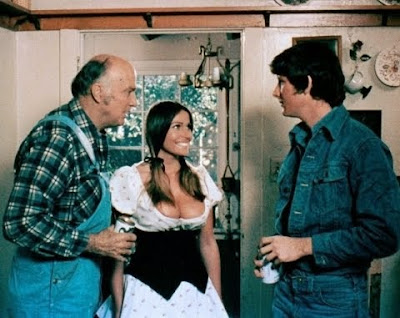Cross of Iron
It's surprising that Sam Peckinpah only made one film set in and around the bloody fields of war, 1977's CROSS OF IRON. So well suited to the milieu of battle is the director that it just seems as if he would've set more of his films in the trenches with gore stained soldiers, in tents with Colonels and Captains as they clash no less harshly over the ideas and symbols of rank and bravery. It is left to this film to incorporate it all, to blend the horrors of war with stinging insight and some gallows humor. To make potent statements on valor and the psyche that only knows purpose when in harm's way.
If you're just seeing this film today, much of it may seem old hat. Unoriginal. Derivative of both films before and after it. Perhaps yet another '70s war pic that makes statements about Vietnam in a WW2 setting, if you're so inclined.
In fact, much of CROSS OF IRON plays like a solid B movie, much the way Samuel Fuller's THE BIG RED ONE from 1980 does. Peckinpah didn't have Lee Marvin (how is it that they never worked together??) as his lead, but rather James Coburn in one of his very best roles. As the thoroughly weary Corporal Steiner, his character is never heard barking purple prose, false bravado and all that. Quite unlike his adversary, Stransky (Maximillian Schell), an officer who positions himself on the front lines in hopes of earning the Iron Cross.
CROSS OF IRON uniquely views WW2 through German eyes, following soldiers as they push their way into Russia. The bulk of the film focuses on Steiner and Stransky, each with differing points of view and attitudes that are equally frowned upon by the high brass. Steiner is the jaded grunt, any sense of pride long since sucked out of him. When questioned by superiors such as Colonel Brandt (James Mason), he bluntly concludes a rant with "I hate all officers." But he respects his men. Following injury and a hospital stay, Steiner refuses a chance for home leave and even the comforts afforded by a nurse (Senta Berger) to rejoin the platoon. He has a conscience and a heart, but also just wouldn't know what else to do. His stock allows nothing else.
Stransky is the grandstanding power grabber, a liar, a coward. He'd make a perfect politician. Schell excels in the role, which is possibly based on more than one historic figure of the time. His final scene with Steiner will be inconclusive to some, but is absolutely perfect to me. A damning and wicked coda to a strong film.
Peckinpah, who may have channeled much of his own worldview through Coburn's character, again demonstrates his flair for action scenes, relentlessly, unblinkingly staring into violence. Here, a way of life. The norm. But perhaps not so strangely, very much like many of his other films. Certainly THE WILD BUNCH. He once stated that he felt all of his films in fact were Westerns. In CROSS OF IRON, it's hard to argue.



Comments